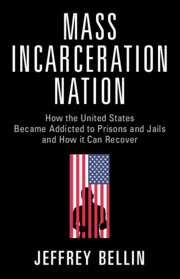 Mass Incarceration Nation
Mass Incarceration Nation Book contents
- Mass Incarceration Nation
- Mass Incarceration Nation
- Copyright page
- Contents
- Figures
- Tables
- Acknowledgments
- Introduction
- Part I What Is Mass Incarceration?
- Part II The Building Blocks of Mass Incarceration
- Part III The Mechanics of Mass Incarceration
- 10 More Police, Different Arrests
- 11 Prosecutors Turning Arrests into Convictions
- 12 Judges Turning Convictions into Incarceration
- 13 Judicial Interpretation
- 14 Punishing Repeat Offenses
- 15 The Parole-and-Probation-to-Prison Pipeline
- 16 Disappearing Pardons
- 17 The Mindlessness of Jail
- Part IV The Road to Recovery
- Conclusion
- Notes
- Index
11 - Prosecutors Turning Arrests into Convictions
from Part III - The Mechanics of Mass Incarceration
Published online by Cambridge University Press: 03 November 2022
- Mass Incarceration Nation
- Mass Incarceration Nation
- Copyright page
- Contents
- Figures
- Tables
- Acknowledgments
- Introduction
- Part I What Is Mass Incarceration?
- Part II The Building Blocks of Mass Incarceration
- Part III The Mechanics of Mass Incarceration
- 10 More Police, Different Arrests
- 11 Prosecutors Turning Arrests into Convictions
- 12 Judges Turning Convictions into Incarceration
- 13 Judicial Interpretation
- 14 Punishing Repeat Offenses
- 15 The Parole-and-Probation-to-Prison Pipeline
- 16 Disappearing Pardons
- 17 The Mindlessness of Jail
- Part IV The Road to Recovery
- Conclusion
- Notes
- Index
Summary
After making an arrest, a police officer typically refers the matter to the local prosecutor’s office. Once presented with a case, that office decides whether to charge the defendant with a crime and, if so, which crime(s). Even if prosecutors initially file a charge, they can still dismiss the case later on. If prosecutors do not dismiss the case, they can seek an informal resolution (often called “diversion”), negotiate a plea bargain on behalf of the government, or take the case to trial. These decisions about which cases to prosecute, and how, are important contributors to the incarceration rate. As this chapter explains, over the era of Mass Incarceration, prosecutors’ primary contribution was to follow the lead of police and legislators. Prosecutors applied the new tools enacted by legislators leading to more severe punishments for crimes generally. And, perhaps most importantly, they uncritically accepted the new mix of arrests forwarded to them by police, flooding the courts with a higher proportion of cases that were easy to prove and punish.
- Type
- Chapter
- Information
- Mass Incarceration NationHow the United States Became Addicted to Prisons and Jails and How It Can Recover, pp. 108 - 120Publisher: Cambridge University PressPrint publication year: 2022


